Bad Kissingen - Amerika Haus
The Situation - 1950
The Army of Occupation and
then the U. S. Constabulary force had little difficulty ensuring
that order was maintained in the U. S. zone of divided Germany.
The de-natzifacation programs went forward and the Marshall
Plan pumped millions of dollars of aid into war ravaged Europe
in the mid and late 1940s. The Army and a wide variety of
governmental and private agencies had significant
responsibilities in what can be called “nation-rebuilding“.
In Washington, plans were developed to reorganize
responsibilities. The goal was to more fully involve the U. S.
State Department and place a civilian face in charge of all U.
S. reform, aid, economic and education programs in Germany.
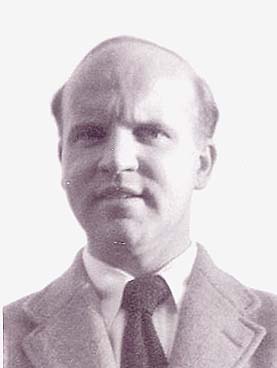 Warrick
Elrod, Jr. in 1950. The Foreign Service takes over. Warrick
Elrod, Jr. in 1950. The Foreign Service takes over.
In the first week of June,
1949, Mr. John J. McCloy was
appointed the United States High Commissioner for Germany. He
was a long time senior advisor and cabinet undersecretary in
Washington. Upon confirmation by the Senate, he became the most
powerful American in Germany, with overall responsibility for
all U.S. based programs. American military forces in Germany
reported to him for the maintenance of law and civil order and
to the Pentagon in all other military matters. Mr. McCloy would
work within the diplomatic circles, there were French and
British civilian counterparts already in place in their
respective zones and a Russian counterpart existed whose
cooperation was problematic. As Mr. McCloy arrived, he brought a
team of the best young men and women the State Department could
provide, hire or recruit from the nation's universities and
graduate schools. The experts arrived.
One of these men, fresh
from the Ivy League and eager for a Foreign Service assignment
was Warrick Elrod Jr. He replaced another civilian whose short
tour in Bad Kissingen had ended in 1950. Some fifty years later,
Mr. Elrod wrote an unpublished memoir recalling his life and
thirty seven year career in the State Department. The estate of
Warrick Elrod Jr. has graciously allowed us to place on line,
most of the chapter from this work that detailed his experiences
in the Kurstadt from 1950 - 1952.
Mr. Elrod was in charge of
the America Haus, a reading room - teaching center and window on
American culture available to the local Germans. He worked in
close conjunction with the local German mayor and other
politicians as “ their “ contact for all things American to
include trying to insure civility between the newly arrived 2nd
Battalion of the 14th Armored Reconnaissance Regiment
and the Kurstadt. Beyond public relations, Mr. Elrod recalled in
a telephone conversation the he also monitored local German
politics closely to insure that Communist and Nazi sympathizers
did not interfere with the new democracy being fostered.
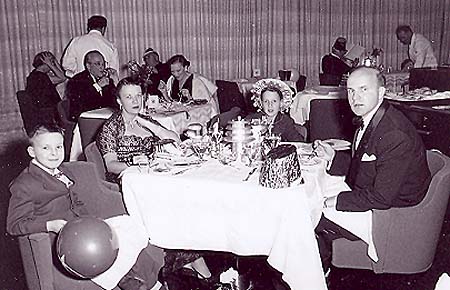 Late 1949, on the
way to Germany on board the U.S. Ship “ Henry Gibbons “, from
left: Norman, Nancy, Rick and Warrick. Late 1949, on the
way to Germany on board the U.S. Ship “ Henry Gibbons “, from
left: Norman, Nancy, Rick and Warrick.
The Americans were
stepping away from simply demanding that the Germans comply on
all things. If there was to be an evolution in German society
leading to a return to full sovereignty and integration into the
affairs of Western Europe, it would be crafted by diplomats and
not soldiers. The point of a pencil had replaced the point of a
bayonet. Mr. Elrod and his peers at work in similar positions
throughout the American zone, the Club of 27 as they were
called, did the heavy lifting of listening, arguing, selling the
program and when done, stepping back. Of particular note, Mr.
Elrod wrote of the start of the long relationship between the
U.S. cavalry and the orphanages in the area. Interestingly,
there is virtually no discussion of tensions along the border
region.
Bad Kissingen - Amerika Haus
Warrick Elrod Jr.
No assignment could have
been more welcome to me than to become Kreis ( regional )
Resident Officer in Bad Kissingen. My predecessor, a bachelor
who had been transferred to Dachau, let me know that I was
welcome to come from Kempten to get acquainted with the town and
the officials with whom I would associate. He would be away but
I was to feel free to stay in the residence which he had ready
for me and my family. The residence was a handsome place with a
large terrace off a long living room which had a bow at one end.
With three bedrooms and a maid’s room there was ample space for
the family. The residence was in an all German neighborhood.
There were three other handsome residences. They stood on the
other side of the Saala River on a small hill overlooking the
town below and were occupied by the three senior officer of the
military sub - post. It was an arrangement that placed the
Resident Officer in greater contact with the German population.
Three doors down from what would be our home for two years was a
beautiful Russian orthodox church which had been erected to
accommodate the Russian Grand Dukes who had come to Bad
Kissingen before the First World War.
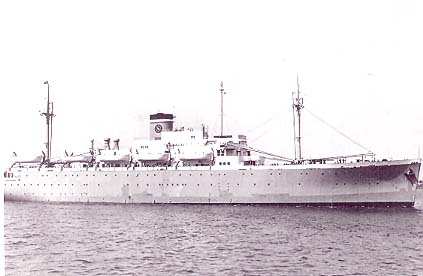 The
Henry Gibbons The
Henry Gibbons
There was additionally
more modest housing for the noncommissioned officers and their
families which, along with the luxurious residences, had been
requisitioned by the U.S. Army, all furnished and with maid and
gardener service. There was a long list of Germans who wanted
their houses back and that problem would take much of my time,
especially as the American military forces increased and a tank
battalion from Schweinfurt moved into the splendid barracks that
had just been vacated by the International Refugee Relief
Organization. The occasion for the military build - up was the
outbreak of the Korean War shortly after our arrival in Germany.
Fearing the Soviets might take advantage of the thinly deployed
US troops in the west by invading the allied sectors from the
east, the United States dramatically increased the military
there. Some of our group, especially those who were located in
military sub posts, facilitated the arrival of these new troops
in their communities, locating quarters where GIs could be
billeted and creating as welcoming an environment among the
local residents as circumstances made possible. Fortunately
there was no invasion but the problem of GIs occupying
requisitioned German houses remained.
I stayed in Bad Kissingen
for two days, just long enough to meet some of the German
officials and especially to meet the German staff with whom I
would work. I was most favorably impressed, especially by two of
them whim I would call my “ two stalwart women.” Frau Groenke
was the senior Secretary and Assistant, an attractive women
perhaps 40 years of age, she was to prove invaluable. Fraulein
Ahlgrim, a second secretary, would prove as valuable. Mr.
Pingoud would be a capable implementer of Reorientation programs
and a Fraulein Eyler was a capable woman handling Women’s
Affairs. No, she was not promoting romantic attachments. She was
seeking to help German women become more politically involved
for the betterment of society. … there were also two other
drivers who each day would load the Volkswagens with films to be
shown in schools, at the America House, libraries and at other
places. The films were about America and were very popular,
especially among the school children.
*** Section omitted
recalling a walking tour of the town and comments on the
architecture and Kur industry. ***
I had entered upon my
duties as Resident Officer in Bad Kissingen with high
expectation and pleasure. I would not be disappointed in any
respect. I would be a representative of the US High Commission,
would work with schools, community organization, with the German
political leaders, seeking cooperation between the Germans
officials and the American military, and overseeing the various
programs which were generally described as “ Reorientation”. My
work would be facilitated by the character of the German and
U.S. military officials who, with one exception, were
unfailingly cooperative, always acting with good will and
friendship. The one exception was the Burgermeister of Bad
Kissingen who occasionally worked against me but with
insufficient effect. ( this is the mayor who preceded Hans Weiss
)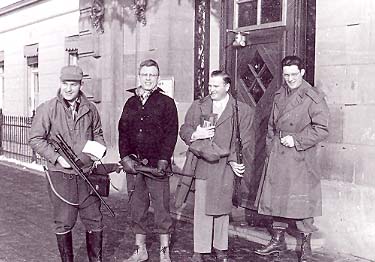
Four members of the Group of
27 ready for a hunt at Bad Kissingen.
The Landrat of the Kreis (
position similar to a state representative ), a Herr Hoffmann,
was a delightful man who supported my efforts to smooth
relations between German farmers and American troops especially
at military maneuver time. A farmer himself, he had been
staunchly anti - Nazi. He became a close friend over my two
years in Bad Kissingen. The military had a splendid
representative, a Lieutenant Colonel James Spurrier, a part
American Indian, Commanding Officer of the tank battalion. There
would be times when the farmers protested the presence of the
tanks running over their fields, the military citing the need
for maneuvers to be ready for any eventuality. Hoffman and
Spurrier would meet with me, discuss the problems, make what
concessions each could make and agree. Hoffman would quiet the
farmer’s fears and cite the need for maneuvers as he had agreed
to, while Spurrier would be satisfied as to the effectiveness of
the exercise. Hoffman spoke almost no English, Spurrier even
less German, but they were men of good will who trusted each
other, rightly so, and could operate as gentlemen.
Whenever I was invited to
a school I accepted. Usually it was an English class that I
addressed. The instructor was interested in showing off his
pupils’ ability to speak and understand the English language.
Usually the class was about the eight grade level. They had
learned to speak with a broad A sound. It sounded strange to an
American ear. But it sounded even stranger when in a lower class
one heard the little fellows saying “ claaaass “ and “ raaaather”.
Since the instructors spoke in the same manner I saw no point in
trying to Americanize their pronunciation.
One of the most active and
successful programs was the town hall meetings in the evenings
in the little towns and villages ( gemeinde - community ). Such
evenings were modeled on the town hall meetings of New England.
There would be one or two a month to which I would be invited.
The meetings were well attended. Matters of some importance
would be discussed, always with civility if there were
differences of opinions. … What was really important was the
success of such meetings. The Germans in most cases, farmers and
their wives, seemed to enjoy these evening sessions and let me
know that they appreciated my attendance. Just such meetings of
the Resident Officer with German citizens made for greater
geniality in the atmosphere of the relations ships of German and
Americans.
Among the great pleasures
of the office were the things one could do to help deserving
Germans who had suffered deprivation in wartime. The High
Commissioner, John J. McCloy, had solicited contributions from
his wealth friends. The contributions were put into what came to
be known as the McCloy Fund. I helped German youths get
financing from the Fund for equipment for their sports club, a
school got funding for needed maps and atlases. These were
lesser grants. A major grant from the Fund financed a small new
wing of a Lutheran hospital, for which a Lutheran Bishop thanked
me at the dedication. The Lutherans had erected a plaque noting
the American generosity. These were only examples of many such
projects.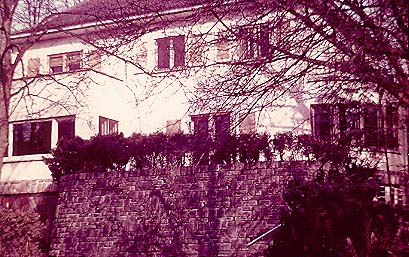
The Elrod home in Bad Kissingen in 1950.
The project that was most
gratifying was not funded by a grant from the McCloy Fund but
was a gift from the tank battalion that had moved into Bad
Kissingen. Some months after the battalion had come the
Lieutenant Colonel, James Spurrier, asked me was there something
the military could do to help us achieve greater understanding
among the Germans of our mission. I told him I could show him
the neediest case where improvement was desperately needed. We
arranged a day when we would both go to see what I called the
neediest case.
One of my pleasures was to
drive around the Kreis to know as much as I could about the
area. On one such drive I had come upon an orphanage. The
grounds were barren, toys were makeshift, clothes were ragged. I
talked to the two nuns who were in charge. They were well
intentioned women who did everything to make childhood less
sorrowful for their wards. They would do more if they could but
resources were badly strained and the church did what it could
to support the orphanage which was little enough. This was what
I called the neediest case. Spurrier and I made our joint visit.
He told the nuns he could do something about the playground. Was
we were leaving a scuffed soccer ball came rolling over toward
Spurrier. He picked it up and showed it to me. It was stuffed
with rags and was the only ball the orphanage possessed. After
showing it to me, he shook his head and threw the ball, if it
could be called that, back to the boys.
A few weeks alter,
Spurrier called me and said the playground equipment was ready
to be installed. We arranged a day and were to meet at the
orphanage. I had expected to see plaything or two, maybe a swing
or see - saw. I had arrived early and was taking to the nuns
when Spurrier drove up in his car. He was followed by an army
truck out of which jumped three husky enlisted men who began
unloading all kinds of equipment which had been made by the
metal working shop or by the wood working shop which were used
to keep tanks in top repair. I was flabbergasted, as I know the
nuns were. The husky young soldiers installed six swings,
sliding boards, a carousel and at least two see - saws. It was
overwhelming, but there was more to come. Spurrier opened a
large box and started taking out soccer balls. He began throwing
them to the children, about a dozen or more, all properly
inflated, and gave one of the boys a pump that would keep the
balls properly inflated. The boys joyfully started kicking the
balls around. They were ecstatic. It may sound like a
description out of a sentimental novel, but the nuns’ eyes were
glistening with tears of joy. The nuns had taught the children
manners. The boys formed a line and in turn thanked Spurrier and
shook his hand. The girls followed and shook hands with Spurrier,
two or three curtseying, a nice note on which to end a festive
day with the nuns blessing Spurrier and three children. I asked
Surrier where his battalion had found so many soccer balls. From
three PXs, he said, paid for by the men at a noonday mess. They
collected more than enough money with some to spare.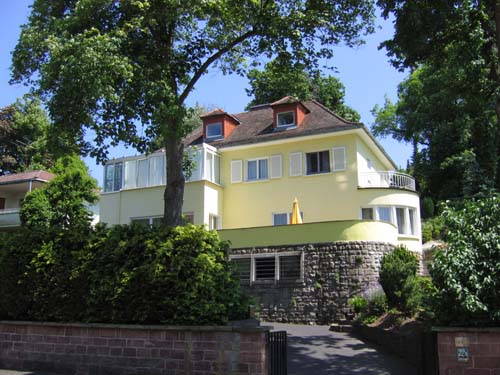
Modern day image of the same
home on one of Bad Kissingen's most prestigious streets.
A few months after we
arrived in Bad Kissingen, Nancy was elected president of the
American Women’s Club. She and the military wives in the club
somehow were able to locate enough new wearing apparel to
provide at least one piece for each child in the orphanage. The
children were happy to get something new.
Sections omitted
**** Mr. Elrod wrote
briefly of various experiences with Germans in the city to
include the growing resentment led by the mayor towards the
presence of US tanks and troops in the town, and an attempt to “
shake down “ the Amerika Haus with a false injury claim. As US
representative, he did his best to defuse the situation.
He also recalled the visit
of Mrs. McCloy, wife of the High Commissioner, to Bad Kissingen
as well as other VIPs and touring Americans associated with the
many on going programs. In 1952, the High Commission for Germany
was significantly scaled back and most of the outreach and aid
programs either ended or were transferred to other departments
of the U.S. government. ****
I finished my two year
stay in Bad Kissingen on a positive note. In the late spring of
1952 the Allied Foreign Ministers of the Occupying Powers met.
There was the expectation on the part of the Germans that their
national sovereignty would be restored. The Bad Kissingen
Municipal Council asked me if I would be willing to discuss at a
meeting with them what had happened at the conference and why
there were new delays in restoring sovereignty. With Frau
Groenke’s advice, I accepted their invitation. The members of
the Council had never been especially cordial to me but they had
not been unpleasant. There had been very little communication
between us as there was seldom any need.
The Kreis Resident Officer
program was to terminate in ten days, the duties of the KRO
being assumed by a Civil Affairs Officer of the Army, such as
they were. Many duties were being greatly reduced and most
programs ended. This was known to the Council and they had a
rightful interest in the change. Much more important to it was
the failure of the Foreign Ministers’ Conference to restore
sovereignty to Germany, which the council hoped would bring an
end to the troops in the town and completely restore the area as
a spa. Frau Groenke accompanied me to the meeting as I wanted to
be certain that I was precise in my German when her translation
might be needed. We sat at a table facing the Council members,
about ten if I remember correctly. The Council Room was filled
with other Germans.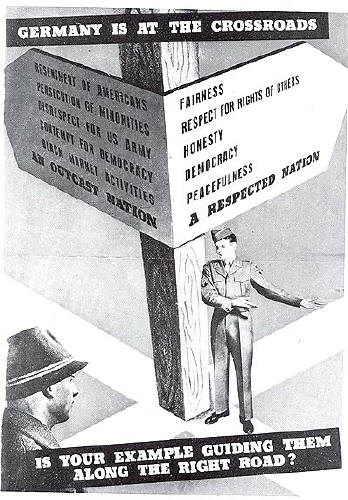
This poster was designed to insure that U.
S. troops understood their mission with respect to post war West
Germany. In the early 1950s, Warrick Elrod, Jr. a member of the
Group of 27, went forward to deliver the same message with a
civilian face and a gray flannel suit.
As I recall I discussed in
detail the results of the Foreign Ministers’ Conference,
informed them that I obviously had nothing to do with future
developments, that even with sovereignty resorted, there would
still be agreements on the stationing and billeting of troops
and their dependents. I did not try to speculate when
sovereignty would be restored or what the consequences might be.
The audience seemed disappointed at the fact that nothing had
transpired to change the situation in Bad Kissingen but the
Council Chairman, a large man with a ready smile, thanked me
with a genuine warmth for coming to the meeting and said that he
respected my integrity in the honest way that I had answered
question. He then said that although I had brought disappointing
news, I was a strong speaker who had carried on a strong
dialogue with strong listeners. He came over to the table where
Frau Groenke and I were seated and shook our hands. …
A few days later, I turned
the office over to an Army Civil Affairs Officer. He seemed
intelligent and decent young man and I gave him what advice I
could, consistent with the greatly reduced duties of the office.
I would leave Bad Kissingen with mixed feelings, one with
regrets for leaving an assignment I had enjoyed and secondly
with a fresh desire to get on to a new assignment in my Foreign
Service career.
*** In 1956, four years
after the departure of Warrick Elrod, West Germany was granted
full sovereignty, the right to re - arm and in doing so, join
NATO to become a full participant in the collective defense of
western Europe. ***
|